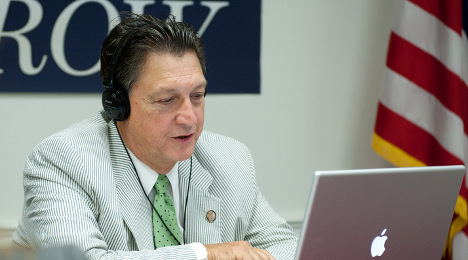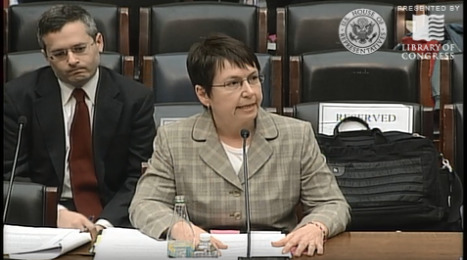Along with giving executives another opportunity to complete the first module of its compliance certification program, the National Automotive Finance Association is rolling out one of its best lineups ever for its annual conference later this month.
The NAF Association acquired 25 percent more conference space to accommodate more programs, sessions and expansion of the exhibit hall for the 18th annual Non-Prime Auto Financing Conference, which begins on May 28 at the Omni Fort Worth Hotel in Fort Worth Texas.
“In keeping the primary focus on member needs, the 2014 annual conference will provide an excellent forum for education and networking for those within the non-prime auto finance sector. This highly regarded conference will cover the hot topics pertinent to the industry along with results from the newly formatted NAF Association Survey,” NAF Association executive director Jack Tracey said.
Among some of the conference agenda highlights:
—Consumer Financial Protection Bureau Q&A: This session is built on questions submitted in advance by NAF Association members. Members’ questions will be compiled, and Rick Hackett, partner with Hudson Cook and former CFPB assistant director will pose the questions to CFPB executives Jeffrey Langer, assistant director, office of installment and liquidity lending markets, and Eric Reusch, office of installment and liquidity lending markets.
—Auto Industry Lending Through the Eyes of a Leading Industry Expert: Attendees of this session will hear observations on auto industry financing from leading industry professional, Sandy Schwartz, president of Manheim and the Auto Trader Group. His views will provide a perspective on how the cyclical swings in financing affect the auto industry at large.
—Subprime Forecast: Revving Up Your Approach to Auto Loan Portfolio Evaluation: Presented by Steve Chaouki, executive vice president of strategy and planning at TransUnion, this session cover how the sector has experienced significant growth since 2010, with strong demand pushing manufacturers to production capacity limits. One of the consequences of this dynamic has been the appreciation of used vehicle values, which in turn has led to a positive equity position on many auto loans. TransUnion’s study quantifies the impact of positive equity on the risk propensities of auto loans, controlling for a series of risk factors related to both the borrower and the loan collateral. Through analysis, Chaouki will show how the presence of positive equity leads to a meaningful reduction of credit risk under certain conditions, and how lenders can leverage this insight to optimize their portfolio management, collections and capital reserve policies.
— Asset Backed Securitization: An Update on Recent Developments and Trends: Presented by Amy Martin, senior director at Standard and Poors this session will focus on the current market trends in non-prime financing. This session will provide information on issuance volume and pricing spread; collateral and ratings performance and Standard and Poor’s outlook for the auto loan ABS market.
Before the conference begins, the NAF Association is repeating the opening segment of its compliance certification program due to strong demand. The association had an overflow crowd when it conducted the training back in January so Tracey decided to hold another session in Fort Worth this month.
The NAF Association offers an exceptional certification program including:
—35 hours in-classroom and online self-paced courses
—In-depth coverage of federal laws and regulations
—Thorough analysis of state laws and regulations
—Complete module devoted to CFPB
“A critical part of a compliance management system is staffing it with qualified compliance personnel. A company having their compliance officers certified through a comprehensive educational program is a clear demonstration of the importance the organization places on compliance,” Tracey said.
Certification participants will be eligible to attend the remaining sessions of the Non-Prime Auto Finance Conference for $195.
For complete details of the conference and the compliance certification program, visit www.nafassociation.com.
Rep. Lynn Westmoreland introduced a bill on the U.S. House floor this week aimed at regulating how the Consumer Financial Protection Bureau handles consumer data.
The Georgia Republican explained the CFPB Data Collection Security Act is meant to address what he believes are important security flaws. The measure would institute five new elements, including:
—Create a consumer opt-out list for CFPB data collection.
—Limit the length of time that data can be held by the CFPB to 60 days after an investigation has been completed.
—Require the bureau to provide one free year of credit monitoring to consumers whose data is used for investigative purposes.
—Require the bureau to be run by a Senate-confirmed director.
—Form confidential security clearance for certain CFPB employees.
“Currently, the CFPB has access to your credit information and offers minimal transparency,” Westmoreland said. “It is highly concerning that they have access to collecting your data without your permission and have no time limit on keeping your information in their system. These CFPB employees can view your information, such as your Social Security and credit card numbers, but don’t have any security clearances.
“You also don’t have the option to request to be taken out of their system or for your information to be deleted from their system. The director of the CFPB, Richard Cordray, was appointed by President Obama and was a highly controversial recess appointment, similar to those brought before the Supreme Court to decide their legitimacy,” Westmoreland continued.
“The CFPB Data Collection Security Act is a simple bill to address a huge problem in protecting your information from not only internal abuse, but from hackers as well,” he went on to say. It improves the ability to know what they have and the right to have it removed from their system. As support for the CFPB Data Collection Security Act grows, I also hope it raises awareness to question the credibility of the CFPB and an examination of the bureau’s necessity.”
Six other House members joined Westmoreland in co-sponsoring the bill. That contingent included:
—Rep. Michele Bachmann of Minnesota
—Rep. Kerry Bentivolio of Michigan
—Rep. Sean Duffy of Wisconsin
—Rep. Billy Long of Missouri
—Rep. Blaine Luetkemeyer of Missouri
—Rep. Bill Posey of Florida
With at least one industry association cheering the move, the Consumer Financial Protection Bureau on Tuesday proposed a rule to promote more effective privacy disclosures from financial institutions to their customers.
The rule would allow companies that limit their consumer data-sharing and meet other requirements to post their annual privacy notices online rather than delivering them individually.
“Consumers need clear information about how their personal information is being used by financial institutions,” CFPB director Richard Cordray said. “This proposal would make it easier for consumers to find and access privacy policies, while also making it cheaper for industry to provide disclosures.”
The Gramm-Leach-Bliley Act (GLBA) generally requires that financial institutions send annual privacy notices to customers. These notices must describe whether and how the financial institution shares consumers’ non-public personal information. If the institution does share this information with an unaffiliated third party, it typically must notify consumers of their right to opt out of the sharing and inform them of how to do so.
The CFPB’s proposal would allow institutions to post privacy notices online instead of distributing an annual paper copy, if they satisfy certain conditions such as not sharing data in ways that would trigger consumers’ opt-out rights. This proposal would apply to both banks and those nonbanks that are within the CFPB’s jurisdiction under the GLBA.
The bureau noted institutions that choose to rely on this new method of delivering privacy notices would be required to use the model disclosure form developed by federal regulatory agencies in 2009.
Richard Hunt, president and chief executive officer of the Consumer Bankers Association, applauded the proposed rule made by the CFPB.
“Many consumers already access account notices and documents via the Internet,” Hunt said. “The announced proposal would allow banks the ability to continue to serve customers in a 21st century manner, while reducing waste and carbon impacts associated with snail mail.”
Under the proposal, the CFPB explained that if an institution qualified for and wants to rely on the online disclosure method, it would have to inform consumers annually about the availability of the disclosures. Currently institutions must send consumers a separate communication about privacy disclosures.
Under this proposal officials explained institutions could include an insert in regular consumer communication, such as a monthly billing statement for a credit card, letting consumers know that the annual privacy notice is available online and in paper by request at a toll-free telephone number.
If an institution chose not to use the online disclosure method, it would need to continue to deliver annual privacy notices to its customers, the CFPB said.
Bureau officials highlighted the benefits of the proposed rule include:
• Constant access to privacy policies: Currently, consumers must receive a copy of their financial institution’s privacy policies once per year. If financial institutions were to choose the proposed alternative delivery method, consumers would be able to view their institution’s privacy policies at any time, while still receiving notices through existing delivery methods if the policies’ terms changed. The online privacy notices would not require a login to view. For those customers with limited or no internet access, financial institutions would have to mail annual notices promptly to customers who request them by phone.
• Limited data sharing: Under this proposal, if an institution shares data with unaffiliated third parties in a way that triggers customers’ right to opt out of such sharing, then that institution generally would not be allowed to use the alternative delivery method. For this reason, financial institutions would have an incentive to limit their sharing to reduce their costs.
• Comparison shopping: Under the proposal, if financial institutions’ privacy policies are posted openly on their websites, they must use the model disclosure form designed by federal regulators. The model disclosure form would allow consumers who are concerned about their personal information to easily comparison shop before deciding which financial institution to use. Consumers could better educate themselves about the various types of privacy policies.
• Cheaper for companies to notify consumers of privacy practices: The rule would potentially reduce the cost for companies to provide annual privacy notices. The Bureau estimates that about $17 million could be saved by the industry annually if institutions were to choose the proposed online disclosure method.
The bureau will accept comments on the proposed rule for 30 days after its publication in the Federal Register.
The Government Accountability Office — the audit, evaluation and investigative arm of Congress — recently completed an audit of the Consumer Financial Protection Bureau’s fiscal years 2013 and 2012 financial statements.
GAO officials said they identified two significant deficiencies in CFPB’s internal control over financial reporting as of Sept. 30, 2013. Specifically, GAO found that CFPB did not effectively design or implement a plan in two areas:
• Internal control over its year-end accrual process to ensure accounts payable amounts recorded were complete and accurate.
• Controls to ensure accurate and complete recording of its property and equipment transactions.
“These deficiencies increase the risk that CFPB may not detect and correct errors in time to prevent misstatement of the financial statements,” GAO officials said. “GAO is making four new recommendations that are intended to improve management’s oversight and controls in these areas and reduce the risk of misstatements in CFPB’s accounts and financial statements.
“These recommendations are intended to improve CFPB’s oversight and controls in these areas as well as to bring CFPB into conformance with its own policies, standards for internal control in the federal government, federal accounting standards, or a combination thereof,” they continued.
Those recommendations included:
• Develop detailed guidance and provide training for CORs to further assist them in identifying and estimating accruals, including examples of expenses that should and should not be accrued at the end of an accounting period and how to calculate amounts to be accrued.
• Strengthen the design and implementation of control procedures regarding the review of the accounts payable estimates to include variance analysis of calculations and comprehensive review of obligating documents, invoices and the CORs’ accrual calculations.
• Strengthen the design and implementation of control procedures to require, as part of the CFO’s quarterly review procedures, review of underlying supporting documents, including tracking schedules, invoices and obligating documents, to ensure that property and equipment transactions are properly identified and capitalized or expensed as appropriate.
• Design and implement control procedures that require coordination between the Office of Procurement and other program offices at the time of capitalization to ensure that property and equipment costs, including costs associated with internal-use software, are properly capitalized or expensed as appropriate.
In a letter of response to Lawrence Malenich, the GOA’s director of financial management and assurance, CFPB director Richard Cordray agreed with the recommendations the audit report detailed.
“We appreciate the cooperation the Government Accountability Office during the CFPB’s annual financial statements audit, and we recognize the significant amount of work you are doing to help us improve the performance, transparency and accountability of the bureau,” Cordray said.
“We concur with the draft recommendations from GOA intended to improve management’s oversight and controls as well as to minimize risk to the bureau,” Cordray continued. “We will continue to implement corrective actions to resolve and mitigate the significant deficiencies identified,” he continued.
“The CFPB is dedicated to upholding our fiscal responsibilities and ensuring that proper management oversight and controls are implements to minimize risk to the bureau,” he went on to say. “We have found that the GAO audit process is especially helpful and important to our work in this area.”
Lawmakers want answers if discrimination is going on at the Consumer Financial Protection Bureau, and they are leveraging legal tools to get them.
The U.S. House Financial Services Oversight and Investigations Subcommittee on Tuesday voted to subpoena two CFPB officials and a union representative as part of the subcommittee’s ongoing investigation into allegations of discrimination and retaliation at the bureau.
Members recapped that the CFPB and the National Treasury Employees Union (NTEU) did not allow the officials to appear as witnesses at their subcommittee hearing on April 2. At that hearing, CFPB employee and whistleblower Angela Martin and Misty Raucci, an outside investigator hired by the CFPB, described a culture of racial and gender discrimination and retaliation against employees at the CFPB.
Lawmakers noted CFPB director Richard Cordray refused to allow Stacey Bach, assistant director of the office of equal employment opportunity, and Liza Strong, director of employee relations, to testify at the April 2 hearing. A third official, Ben Konop, the executive vice president of the CFPB employees’ union, was also not allowed to testify by the union.
All three individuals were subpoenaed.
“Unfortunately, the CFPB and the NTEU refused to provide the requested witnesses to testify at the April 2 hearing. And yet, we maintain it is imperative that we are able to question Ms. Bach, Ms. Strong and Mr. Konop,” said Oversight and Investigations Subcommittee Chairman Rep. Patrick McHenry, a North Carolina Republican.
“Through our investigation, it has become quite clear to this Subcommittee that they are the three individuals with the most knowledge of the disturbing treatment which women and minority employees were subjected to while at the bureau,” McHenry added.
According to officials, Bach and Strong have retained outside counsel to represent them in connection with the subcommittee’s investigation.
“It’s regrettable that director Cordray refused to allow these CFPB officials to testify at the April 2 hearing about what they know of the Bureau’s hostile work environment and the retaliation by managers when employees dare to complain," said Financial Services Committee Chairman Rep. Jeb Hensarling, a Republican from Texas.
“For the sake of Angela Martin and other CFPB employees who are suffering, our investigation will move forward. All those engaged in this reprehensible behavior at the CFPB must be held accountable,” Hensarling continued.
Martin, the CFPB whistleblower who serves the CFPB as a senior enforcement attorney, told members of the subcommittee on April 2 that she is “a victim of discrimination by the Bureau dating back to May 2012, and I have suffered severe retaliation since December 2012 which continues through today.
“Sadly, my story is not unique. My colleagues likewise have suffered and are suffering at the hands of inexperienced, unaccountable managers,” Martin went on to say.
EFG Companies highlighted that it recently became one of the first F&I product providers to have its entire field services team certified by Association of Finance and Insurance Professionals (AFIP).
By certifying its entire team at once, EFG explained that it’s now possible for its client base to receive the immediate benefits of the company’s certification, whether through mentoring the dealer’s staff through AFIP certification, one-on-one coaching or completing dealer compliance audits.
Founded in 1989, AFIP is the nonprofit, non-aligned sanctioning body for in-store sales and financial services personnel and select lender and aftermarket vendor personnel in the United States. AFIP certification curriculum focuses solely on the federal and state laws that govern in-dealership financial services.
EFG Companies president and chief executive officer John Pappanastos emphasized the retail automotive industry has always been one of the most highly regulated. With the recent increase in regulation oversight, Pappanastos insisted non-compliance can create massive financial exposure for dealers, lenders, agents and vendors.
“Our clients look to us to ensure that their teams have appropriate processes and controls in place to navigate more than a dozen federal laws and find their way through the many state and local laws that impact their operations,” Pappanastos said.
“With that in mind, we took the initiative to get our entire field services team certified by the only regulatory compliance program that requires proctored exams under controlled testing conditions. Achieving AFIP certification across the entire team demonstrates our commitment to our clients,” he went on to say.
With its field team 100 percent AFIP certified, EFG’s client representatives, trainers and recruiters can more effectively train, audit and support their clients, who will continue to see compliance with state and federal regulatory requirements as a critical priority in their business moving forward.
“AFIP’s primary objective is to protect dealers by ensuring that in-dealership F&I practitioners and sales executives are fully aware of the applicable state and federal regulations — and take responsibility for their actions,” AFIP executive director, David Robertson. “Regulatory knowledge, coupled with personal accountability, keeps thousands of dealers out of harm’s way.”
While Republican members of the U.S. House Financial Services Committee have often questioned how the Consumer Financial Protection Bureau goes about its business, now a member of the GOP from the U.S. Senate is looking to reform how the agency operates.
Sen. Deb Fischer introduced two bills offering structural reforms to the CFPB. The Nebraska Republican explained the Consumer Financial Protection Commission Act of 2014 (S. 2213) would replace the agency’s single director position with a five-member, bipartisan commission.
Fischer’s second bill, the CFPB Improvement Act of 2014 (S. 2212), would change the requirement for the Financial Stability Oversight Council’s (FSOC) voting members to overturn CFPB regulations.
“The CFPB has an enormous amount of influence impacting all sectors of our economy and every consumer nationwide. Decisions governing such a powerful agency should reflect input from all sides, rather than placing broad regulatory authority in the hands of a single unelected official with little oversight from Congress,” Fischer said.
“Similarly, the approval process for regulations issued by the CFPB requires changes to strengthen oversight. These two bills reform CFPB and FSOC’s structure to ensure greater accountability and enable the agency to more effectively carry out its mission of consumer protection,” she continued.
The Consumer Financial Protection Commission Act of 2014 would replaces the director of the CFPB with a bipartisan commission of five individuals. It also would establishes four other elements, including:
—Each member would be appointed by the president and confirmed by the Senate.
—Commissioners would each serve staggered five-year terms, and no more than three commissioners could be from the same political party.
—A chair of the commission position would be created. This position would be filled by one of the five commission members to fulfill administrative and other duties
—The legislation would not take effect until July 16, 2018, the day after the end of current CFPB director Richard Cordray’s term.
Fischer pointed out that in May of 2011, and again last February, 43 and 44 Senators, respectively, signed letters to President Barack Obama requesting this reform.
The Nebraska lawmaker went on to highlight the CFPB Improvement Act of 2014 would change the requirement for FSOC voting members to overturn CFPB regulations, incorporating a trio of procedures:
—Currently, two-thirds or seven the FSOC’s 10 voting members are required to overturn CFPB regulations.
—This legislation would change the two-thirds requirement to a simple majority.
—It would also exclude the director of the CFPB from such a vote, removing any individual bias.
The reforms included in Fischer’s bills were recently passed by the House as part of H.R. 3193, legislation sponsored by Rep. Sean Duffy, a Wisconsin Republican and member of the House Financial Services Committee.
Duffy applauded the introduction of Fischer’s legislation in the Senate.
“I commend Sen. Fischer for her efforts in the Senate to hold the CFPB accountable to the standards of transparency that they promised the American people, but have yet to deliver,” Duffy said. “This is a dangerously powerful and unaccountable agency and must be reined in. I will continue my efforts in the House and am glad to have a strong ally in the Senate.”
During a speech last week to the American Bar Association, Richard Cordray again described the rule-making process the Consumer Financial Protection Bureau uses. The director also touched on a new project labeled, “regulatory implementation.”
When creating new or modifying current rules, Cordray explained how the process is intended to unfold using the example of a significant impact on a substantial number of small businesses, which can include dealerships. He noted the CFPB has a process of creating small business review panels in conjunction the Office of Management and Budget and the Small Business Administration’s Office of Advocacy.
“The goal is to gather input on our ideas from small financial services provider panels before we formulate a proposal. Concurrently, we have made it our practice to solicit the input of other stakeholders as well, including larger institutions, consumer advocates, vendors, government agencies and other parties as appropriate depending on the nature of the rulemaking,” Cordray said during the ABA event.
Next, rules changes must be published in the Federal Register, giving the public a certain amount of time to submit comments before the changes are officially enacted. Cordray said he believes most people do not read the Federal Register
“And while agency communications with the public have improved over the last 60 years, it is still the case that rulemaking remains largely inaccessible to the average citizen and most of the businesses to whom the rules apply,” Cordray said. “Unsurprisingly, many comments come from a cottage industry of trade associations, advocates, lobbyists, and regulatory lawyers who are fluent in agency processes.
“While such groups play an important role in the vetting of rules, individual citizens and smaller businesses may find it difficult to participate and present their experience and their views. So we have made serious efforts to seek more input from the broader public,” he continued.
Furthermore, Cordray indicated the CFPB is in the process of considering other areas for rulemaking where the bureau will be implementing federal law but “without a specific congressional mandate or timeline.” In these areas before commencing the rulemaking process, Cordray insisted the CFPB has sought to build our foundation of knowledge through a variety of means.
“This ranges from research that we have conducted and published, to market monitoring efforts that we have been developing, to processes of securing public input through requests for information and advance notices of proposed rulemaking. We also have made a point of going outside of Washington to hold monthly field hearings on subjects of general interest and concern, such as payday lending, debt collection, or credit reporting. These hearings enable us to get more perspective from consumers and other stakeholders located in diverse communities throughout the country,” Cordray said.
Corday Describes Regulatory Implementation
Later in his presentation, Corday shared his thoughts on an approach he contends is “vital to good rulemaking.” He called this process regulatory implementation.
“At the Consumer Bureau, our rulemaking process does not end with finalizing a set of rules. It is not good enough for us to take the view that once new rules are published, our work is done and we can say to financial institutions that ‘it is your problem now.’ If the point of our regulations is to protect consumers and to promote fair, transparent, and competitive markets, then we should care a great deal about how well the rules are implemented,” Cordray said.
The CFPB director acknowledged that federal agencies routinely provide some period between issuance of a rule and its effective date to allow for an implementation period.
“This period allows a sensible transition time to adjust to the new regime, which includes the need to make operational changes, develop new processes, and train employees to understand and effectuate the changes that are being made,” Cordray said. “To focus more closely on operational changes, in this day and age one of the major projects is always to overhaul IT systems, not a factor at the time the APA was enacted but now a critical factor for both financial organizations and their service providers.
“But the entire range of operational changes poses interesting problems, which may not be fully understood until the process is underway and the problems are confronted directly,” he went on to say.
Cordray also acknowledged it can be difficult for companies and their personnel to gauge the appropriate length of the implementation period for a given rule or set of rules.
“In our notices of proposed rulemaking, we typically seek comment on this issue. Industry representatives often seek a long implementation period, but they rarely provide any persuasive data to explain exactly why the estimated period is actually justified,” Cordray said. “Perhaps this is because they may not know themselves how to predict the future course of a brand-new project, which is understandable enough. Reasonable people might judge that we have set certain implementation periods either too long or too short, depending on how the steps in the process actually unfold.
We have made it a point to have people at the bureau with background and experience in financial operations, which helps, but we would clearly benefit by getting more and better information from regulated entities about these issues,” he continued.
“It is unclear how best to resolve this dilemma, but we are very committed to developing sensible and workable solutions. We will continue to learn more about these issues by deepening our outreach to vendors and taking other steps to set appropriate implementation periods,” Cordray went on to say.
Cordray’s complete remarks can be found here.
A senior enforcement attorney at the Consumer Financial Protection Bureau and an independent investigator offered more than two hours of testimony on Wednesday of alleged discrimination happening within the agency.
During a hearing orchestrated by the U.S. House Committee on Financial Services Subcommittee on Oversight and Investigations, Angela Martin told lawmakers about her ordeal at the bureau that according to her account goes back nearly two years.
“I am a victim of discrimination by the bureau dating back to May 2012, and I have suffered severe retaliation since December 2012 which continues through today,” Martin said in her opening statement.
“Sadly, my story is not unique. My colleagues likewise have suffered and are suffering at the hands of inexperienced, unaccountable managers. I am glad this hearing is being held because, based on my observations at the bureau, I have concluded that the bureau is sorely in need of effective oversight, and that bureau management needs to be held accountable, particularly with regards to its internal management practices,” Martin continued.
Martin shared that she has almost 19 years of civil service experience, including a decade as civilian attorney handling debt collection matters with the Judge Advocate General Corps. at Fort Bragg, one of the U.S. Army’s largest installations that’s located in North Carolina.
“I came to the bureau in June 2011 with hopes of enforcing federal consumer financial laws on a national level, and I dissolved my successful law practice to do so,” Martin said. “The mismanagement and abuse of authority have precluded me from doing my part to carry out the bureau’s important mission. Indeed, today marks the 400th day that I have been isolated and prevented from performing any meaningful work.
“I never received a fair shake at the bureau, and I have not been assigned one case or enforcement matter during my entire tenure,” she went on to say.
Martin told lawmakers she filed a discrimination complaint in December 2012 and sustained an immediate backlash. She alleged that supervisors told her counterclaims would be filed if she followed through with a discrimination suit against the CFPB.
Martin also asserted colleagues have filed claims because of alleged discrimination as recently as two weeks ago.
“Many employees have come to me and told me alarming stories of their own maltreatment and the retaliation that resulted when they opposed mismanagement or exercised any individual right. Essentially, certain managers have adopted an authoritarian, untouchable, unaccountable and unanswerable management style,” Martin said at Wednesday’s hearing.
“It is critical for management to be held accountable and for the bureau to be subject to real and effective oversight so as to effectuate its Congressional mandate, enabling its staff to focus on its vital mission. This oversight must be accomplished for the sake of the bureau’s duty to consumers and its directive to ensure that businesses that refrain from breaking federal consumer financial laws are not competitively disadvantaged,” she continued.
“My individual story is a microcosm of the larger story of what happens to individuals within the bureau when they step forward with complaints of wrongdoing. I hope that the bureau will recognize that it must take steps to foster a culture in which employees are able to raise concerns without fear of reprisal. I urge this committee to approach its duties of oversight diligently and expeditiously for the sake of my colleagues who are suffering in silence even as we speak, and to enable the bureau to carry out is mission,” Martin went on to say.
The independent investigator assigned to Martin’s case corroborated the alleged discrimination during her testimony on Wednesday. Misty Raucci is a former investigator at Defense Investigators Group, a firm based in Hanson, Mass., and told lawmakers that she spent six months investigating Martin’s claims.
“I became a veritable hotline for employees at the CFPB, who called to discuss their own maltreatment at the bureau, mainly at the hands of Scott Pluta or Dane D’Alessandro,” Raucci said. “The sum of my findings was that Scott Pluta retaliated against Angela Martin after she filed a formal complaint of discrimination and retaliation.
“In concert with at least three facilitators, Mr. Pluta effectively removed Ms. Martin from her position as chief counsel of consumer response, and saw her relegated to a lesser position in another office. Mr. Pluta attempted to justify Ms. Martin’s removal by expressing doubt as to her ability to perform her duties as chief counsel; however, his criticisms largely occurred after she filed her complaint. This was a major indicator that Mr. Pluta’s rationale for demoting Ms. Martin for what he perceived as shortcomings was masking his other motives,” Raucci continued.
Raucci wrapped up her opening statement by mentioning the bureau’s Human Capital Office is in receipt of “extensive documentation” that the Defense Investigators Group gathered.
“The evidence of the documentation suggests a pervasive disregard for employee rights that is entrenched in the Office of Consumer Response,” Raucci said. “Those responsible for curtailing Mr. Pluta’s activities were apparently compelled to ignore, cover, or downplay them instead of taking corrective action. The corrosive environment of the CFPB workplace was engendered by the bureau’s perpetual failure to uphold its own (equal employment opportunity) policies.”
The House committee invited Liza Strong, the bureau’s director of employee relations, to testify, but she did not appear at Wednesday’s hearing.
SubPrime Auto Finance News reached out to the CFPB to obtain reaction to Wednesday’s proceedings. In a statement, bureau director Richard Cordray said, “I take seriously the concerns raised at (Wednesday’s) hearing and deeply apologize to any member of the CFPB staff who feels that they have not been heard or treated fairly. I welcome the opportunity to appear before Congress to discuss these issues fully.”
After more than an hour of questioning, one committee member gave an emotional outburst when her turn arrived to have the hearing floor. Rep. Ann Wagner is a Missouri Republican.
“I would also note that the bureau, the CFPB is absent from this hearing,” Wagner said. “Ms. Martin, I cannot thank you enough for being here, coming forward and your courageousness and leadership. We’ve heard words today like heartbroken, alarmed, stunned and moved. I am outraged is what I am. As a woman, as a legislator, as an American, I am outraged with what you’ve been through. You will have justice Ms. Martin. We as a Congress must make it stop. The CFPB must have oversight. It must have accountability. And it must have transparency. This is absolutely egregious.”
The Consumer Financial Protection Bureau said in its annual report that consumer complaint volume increased 80 percent in 2013, but vehicle loan issues still constitute only a small amount of the overall total.
The CFPB indicated this week that overall complaint volume nearly doubled from 91,000 complaints received in 2012 to 163,700 complaints received in 2013. However, only about 3,500 complaints from last year’s total were associated with either a vehicle loan or lease.
From July 21, 2011 through June 30 of last year, the CFPB received approximately 176,700 consumer complaints, but during that stretch vehicle contracts comprised only a small amount of that total figure — about 2,700 complaints.
The bureau carved out percentages of complaint categories that comprised vehicle contract issues in 2013. That breakdown went as follows:
—44 percent: Managing the loan or lease (billing, late fees, damage or loss, insurance GAP, credit, etc.), credit reporting, privacy.
—23 percent: Taking out the loan or lease or account terms and changes (changes after closing, rates, fees, etc.), required add-on products, trade-in payoff, fraud.
—22 percent: Problems when consumers are unable to pay (debt collection, repossession, deficiency, bankruptcy, default).
—11 percent: Shopping for a loan or lease (Sales tactics or pressure, credit denial, confusing advertising or marketing).
To date, including this year, the CFPB said it has received more than 310,000 complaints overall. According to the latest report, the top three complaints in 2013 by consumers were:
—Mortgages: The No. 1 most-complained about consumer product was mortgages, accounting for 37 percent of overall complaints. For these approximately 60,000 complaints, consumers were most concerned with problems when they were unable to pay, such as issues relating to loan modifications, collections, or foreclosures.
—Debt collection: Debt collection was the second most complained about category, accounting for 19 percent of overall complaints even though the bureau did not begin accepting debt collection complaints until July of last year. For the approximately 31,000 debt collection complaints, consumers were most concerned with collectors attempting to collect debt not owed, communication tactics by the collectors, and collectors taking or threatening illegal action.
—Credit reporting: The No. 3 most complained about category was credit reporting, accounting for about 15 percent of overall complaints. For the approximately 24,000 complaints about credit reporting, nearly three out of four consumers were concerned with incorrect information on their credit report.
The bureau explained that it expects companies to respond to complaints within 15 days and to describe the steps they have taken or plan to take.
CFPB director Richard Cordray went on to mention that the agency expects companies to close all but the most complicated complaints within 60 days.
Cordray noted companies have responded to more than 93 percent of the complaints sent to them for response, and consumers have disputed only 21 percent of those company responses.
“Consumer complaints have become central to the work of this agency,” Cordray said. “They enable us to listen to, and amplify, the concerns of any American who wants to be heard.
“They are also our compass. They make a difference by informing our work and helping us identify and prioritize problems for potential action,” he went on to say.












